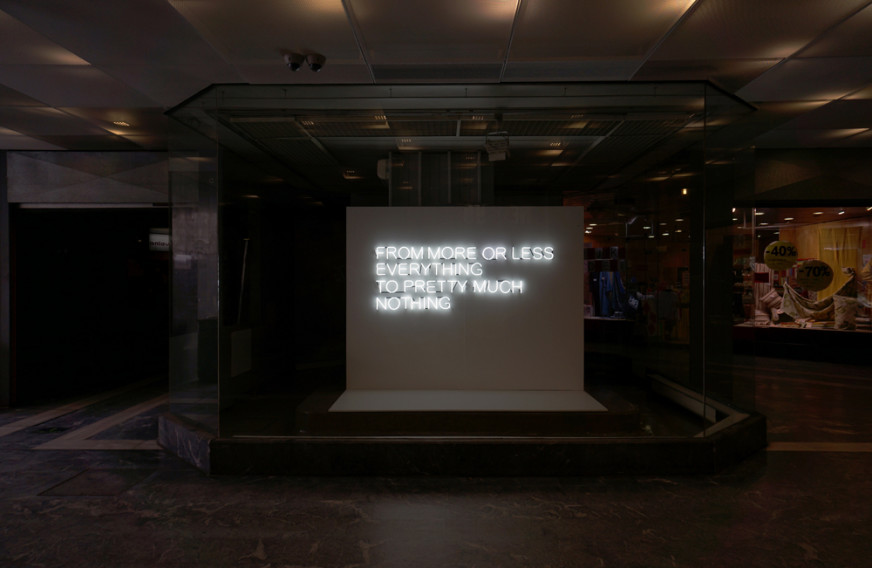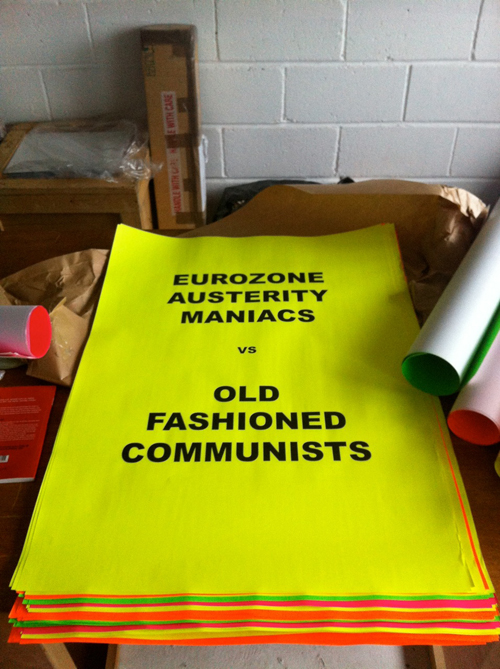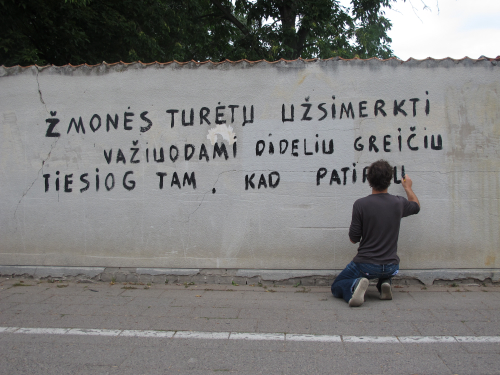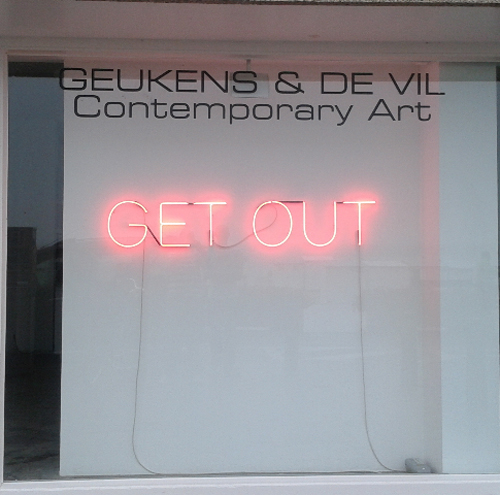From More or Less

We are travelling on the underground together. Chatting away, exchanging stories. At a certain point we reach the station where X has to depart. He’s half way through something; a recollection of childhood, something about an old woman who lived in the house across the street. Doesn’t matter he says, I’ll tell you another time, and then he exits the carriage, laughing, and I know he won’t tell me, and that I won’t remember to ask. Instead the story stays with me, in its unfinished form. The woman’s unduly youthful face, her garden that smelled of juniper and the gray cats that seemed to patrol the space marked out by its walls.
The Coming Storm is a performance made of stories though they’re not so much told as unsystematically unravelled and then chaotically re-woven. A small number of the stories in the performance get completed, and a few you can easily guess the ending of even though the telling is abandoned far from the point of arrival. More often than not though the stories get cut off at a place we’d never know what was supposed to come next. There’s a teasing aspect to this process of course, and a frustration built into the thwarting or truncating of narrative arcs which we know already from the durational story-telling work And on the Thousandth Night…. Mostly though, what the cutting off, mashing and colliding of incomplete narratives produces in each case – for me at least – is a feeling of freedom. Instead of tidy but rather cramped closure, well-packed or neatly rounded argument and coming to conclusion(s), in this piece there are sparks as there were in the story I half heard on my underground train journey; the dynamic unruly flurry of the possible, the continuing drama of untied ends. Sitting in the dark we’re gifted the void space of the story that is missing in which to do our own telling.
The incomplete narrative in this sense is always a proposition, an initial set of co-ordinates, tensions or possibilities which, we might expect, will play through in the next phases of what happens. But instead of playing through, in a work like The Coming Storm, these energies will be sublimated – cut off or interrupted on the one hand, or abandoned altogether on the other, as performers find other things to do – and these narrative persist nonetheless. There are untied ends flailing in space, echoes and tangles which continue long after an initial sound, colouring what happens in the performance, affecting how we read what transpires, affecting stories which come afterwards.
There’s a also joy in making a piece like The Coming Storm in that it celebrates a level of carnivalesque reversal and upheaval. On a stage like this one the best and serious intentions of one performer frequently bite the dust thanks to the contrary and less than worthy mischief of another. There’s a fluid balance (not really a balance at all, more like a war) between order and disorder, coherence and incoherence, ‘readability’ and libidinous anarchy. As director in the group process of making a performance like this I know that I’m not really on one side or another, and certainly not attempting to draw things to their sensible conclusion; I’m rather more locked in the role of a cruel referee determined to get the most incident from the drawn-out conflict and the ongoing tension. My favourite moments in this performance are those held in an almost impossible, unsustainable suspension – like the earnest but upbeat narrative from Robin and Terry about the possibility of an optimistic story on the TV news, being told in one part of the stage, whilst elsewhere Richard spins through a farcical comedy routine about a failed suicide – desultory sack on head, a rope in his hand and nowhere to suspend it from. I love the very different kinds of incompletion in this too – the tonal one especially, which in its contradiction devils any chance of ‘reading correctly’ what’s going on. Again, in the incommensurable narratives or energies, the blunt cutting of one things and another – the tragic and the comic intertwined – there’s something true to our lives here; lives lived as process or as becoming, rather than statement or certainty.

Acts of Voicing
Württembergischer Kunstverein, Stuttgart.
On the Poetics and Politics of the Voice
October 13, 2012 – January 13, 2013
I’m showing my collage prints and projections from the performance Void Story as part of this show as well as the neon Wait Here. Full info about the show here.
The voice is difficult to grasp—for, in contrast to the eye or the ear, it is not an integrative organ of the senses but is rather spawned by the transient interplay among several organs, such as the lungs, vocal chords, tongue, and gums. The voice always simultaneously exists both inside and outside of the body, and its immateriality weights just as strongly as its social and political import. It equally yields screaming and talking, sense and nonsense, noise and chanting. What is more, the voice is not only a tool of articulation but always likewise associated with action: it can name things, give commands, or swear an oath, declare people innocent or man and wife. How to Do Things with Words? reads the title of John L. Austin’s 1962 book on speech-act therapy.
The exhibition Acts of Voicing deals with the aesthetic, performative, and political significance of the voice from the vantage point of visual art, dance, performance, and theory. The exhibition centers on the agency and performativity of the voice. The aim is to examine both the resistive and the disciplined/disciplining voice—those voices that are heard and others that are not. Fighting to have one’s voice heard is as much of a topic as the power to silence someone or to force them to speak.
Intro text continues here.
*
Vote Back! / Stem Terug! DE VERBEELDING
Frascati & de Appel Arts Centre
Performance Saturday 6th October at 19.30 at Frascati.
Meanwhile my monologue text of mashed up political speeches Although We Fell Short , performed by Kate McIntosh is presented as part of this event on 6th October at 19.30 at Frascati in Amsterdam. Info here. Also – around the building – my Fight Posters.
*
Finally for the moment, I made a contribution to this investigative and publication project – Des Formes De Vie – comprising a four page chunk of my accumulating to do lists from 2010. Scary reading.
Franck Leibovici
(des formes de vie) une écologie des pratiques artistiques
Questions Théoriques, 2012

Photographs from my work Ways Forward, realised this last weekend in Vilnius as part of the Baltic Triennial of International Art .
“The 11th edition of the Baltic Triennial of International Art is taking a 12 day event focused exclusively on performance and film. Countering the general tendency of biennials to be pluralist, all-encompassing multi-platforms, the curators choose to channel the contributions of artists through a radically minimized vessel – one human being. The Triennial is entitled after its medium who in his own right carries one of the most common Lithuanian names, Mindaugas.
During the day, Mindaugas (the name alludes to ‘daug menąs’ – much wisdom, ‘daugiamintis’ – the one who has many ideas, or ‘daugio minimas’ – much fame) is operated by a number of artists by way of a set of instructions, script, score, scenario etc. to be played out by Mindaugas during the course of one particular day in the city of Vilnius or nearby surrounding areas.”

“Wenn der Löwe sprechen könnte, wir werden Ihn nicht verstehen”
“When the lion could talk, we wouldn’t understand him”
Ludwig Wittgenstein
03/08 – 09/09/2012
With works of
Carl ANDRE – Robert BARRY – Peter DE MEYER – Honoré d’O – Tim ETCHELLS –
Shilpa GUPTA – Gideon KIEFER – Peter LINDBERGH – Perry ROBERTS
At Geukens & De Vil, zeedijk 735, 8300 KNOKKE
This is the text that I read at the really great opening event of the International Student Drama Festival in Sheffield on Friday 22nd June. It starts with a reference to another pretty inspiring event I took part in the same day – a panel discussion at Free Word in London, organised by LIFT and Index on Censorship.
*
I was on a panel this morning as part of the LIFT Festival working with Index on Censorship, at London’s Free Word Centre .On the panel were theatre makers from Iraq, Belarus and Lebanon; Lucien Bourjeily, a Lebanese film-maker and theatre director who brought improvised theatre to the streets of Beirut during the political turmoil in 2008; Natasha Kaliada and Nicolai Khalezin, co-founders of Belarus Free Theatre, which performed underground until they were forced into exile in 2010; and Monadhil Daood who founded the Iraqi Theatre Company in 2008.
We were talking about what made us work,
what our relation was to issues of censorship and freedom of speech.
I mean it was pretty humbling
and in many ways it felt absurd for me to be speaking at all
given that I was the only person on the panel who had not seen colleagues, friends and families persecuted, imprisoned, tortured or even killed in pursuit of their artistic work or simply for being there.
I can say for sure that these are not the problems I’ve faced in 27 years of making, performing, challenging and provoking in my work with Forced Entertainment… or in the role I’ve taken on recently as a professor at Sheffield University, working with students in theatre at the university.
But on the other hand what we spoke about this morning in London reminded me
minded me
of the importance of the space we do have in the arts
and of the limits we do have on in that space
and of the importance of staying free
and real
and live and now
We are – in case you hadn’t noticed – living in a space of economic downturn
neo-conservative politics
a space which offers us the dismantling and out sourcing of state functions (health, education, arts)
and in general
cuts
and with cuts a steady insistence on the importance of private sponsorship
a situation in which, little by little sponsors help to define the shape of public institutions.
We’re also living in a space here in Britain
where even public money is more and more focused through instrumentalist agendas, more and more focused on the delivery through arts of quantifiable outcomes.
There has been
a turn in Arts Council application process in which they are asking ‘how can you help us to deliver our vision’ – and that still shocks me, because,
I always thought
and still believe
for very good reason
that it was, is, and should be, the other way around.
In the broadest sense – in the world of private sponsorship and in the funded sector there is I think an attempt to make an image of the arts as a space of convivial affirmation
which is fair enough in one sense.
Reading the materials these days you’d know that art is about celebrating, bringing together, and affirming. You’d know that its about creative self-expression.
It’s harder somehow
to find reference to things like the fact that the arts might challenge, provoke or disturb.
It’s hard to find an emphasis on things like difficulty, difference, division or dissent.
Anyway.
We are here at the opening of the International Student Drama Festival in Sheffield – nine days packed with 20 performances and something like 260 workshops –
and I think this will be an amazing opportunity to show and to meet and to invent.
In 1984 my colleagues and I moved from Exeter where we had studied, here to Sheffield
I don’t know now what we were doing or thinking back then –it’s lost – I don’t even think we really knew at the time.
But I’m sure we had a sense that there could be
should be
a new theatre
a way to talk about the world we were living through, the situation we were born into,
the world we were starting to inhabit and play a part in as artists and citizens.
I imagine, one way or another, that is the reason that you are here also
each in your own ways
that you feel/know/think/intuit that the world needs a different way of speaking into it,
a new way of being articulated or unpicked.
I cant know of course and I cant advise.
Or again, to say it another way,
perhaps I can flag here some of the things that all of you already know.
You know that you were born in a certain time at a certain place, and that in time you have a particular eye on what’s around you, a certain ear to the culture, a kind of radar set in particular ways. I can say – which you all know already – be true to that. And trust that all of it is relevant. Everything you know, everything that you’re curious about, everything that you’ve seen, felt, figured out, loved, hated, suffered, enjoyed, everything connects to what you can do, what you will do, what you have to do, in a certain sense. In that way – as you know already – what you are is strangely, weirdly, in one sense minutely and in another sense totally, unique. A strange balance of histories, passions, skills, mistrusts, angers and lusts – a balance that’s beautiful, awkward, ugly, tough. Keep it that way.
I am talking about what you know already – about your knowledgeable love of computer games, or your passion for Country & Western, Bollywood or outdated political mainfestos or makeshift structures made out of wood. Your skill at maths, your sense of humour, your fear of heights, words, other people, being touched, your love of crowds, flow-charts, dubstep or other things. The combination of these things, there, in you, that you know about already, was not possible before you because this particular moment – in the culture, in the global, the local social and the sexual politics – never was before, and because these things, and others, never met before in that particular set of circumstances, personal and otherwise, that is you.
I want to say – what you know already or you would not be there in the first place – that something, now, is possible in theatre, in performance, in live art, in any medium, that was not possible before. And that something – is what you have to do, follow, articulate, question, invent or find and you are the only person or persons that can do that.
I advise that you steal things, from everyone and anyone. Take one thing from everything you love and then hide, mix and rework it all in what you do. Take one thing and make it yours. William Burroughs in his brilliant essay Les Voluers prescribes appropriation and remixing as a form of artistic practice and quotes Genet, I think, saying that “the thief is in no hurry” – take time, he says, to survey the scene – everything is there for you to take.
I also advise that you be promiscuous (artistically and otherwise if that’s possible) – start conversations, open possibilities, try things, drift, stay curious. Do not lock things down too much too early. Do not lock things down at all. Know – which you know already – that ‘the thing you do’ can shift and change, that your interests are diverse, and that their articulation, might at some point take many forms. Don’t lock things down or get trapped and don’t (either) be distracted by every stupid thing that comes along. Let go and hold on. Be open and defend.
I say that the good work comes from people that follow their noses. That the good work comes from people who don’t fit, or whose dogged sticking to a thing, whose dogged pursuit of a thing that no one else cares for, becomes a resource for the rest of us – a revelation, an assertion, an awkward insistence, a hymn to a possibility that we might well otherwise have overlooked.
I say – which you know already – as you go forward as makers, writers, directors or performers, don’t be afraid of identifying ways in which what you do meets the agenda of other people, institutions, bodies, funding structures. You may be new writing, you may be audience development, you may be cross-artform, you may even be cultural industries and regeneration of urban landscapes clause 9 sub-paragraph 4, artistic enterprise. Its all fine. You can be inventive and resourceful and assertive in all that. You may be these things – talk that talk and fit temporarily or otherwise into one hole or another – its all fine. But – I say – please know, which you know already – that you are also none of those things, that what you do comes from another place, that the good work in fact, the best of it, conforms to no agenda, is not a truly comfortable or fully compliant part of any scheme, plan or provision, that what you do as artists sets its own pace, place, aesthetic, context, context, that you’re occupancy of any of these positions described above is at best only ever temporary and tactical, only ever a means to an end, and that the end, in the end, is the work you make, and that the work makes its own rules. Nothing less than this is good enough. Everything else is bullshit.
I’m thinking back to this morning and the discussion about the space of relative freedom we have here in the arts and as I do so
I’m wishing you a great festival of
purposeful playfulness
or of endless propositions for playful purposefulness
a festival of serious unseriousness or the best kind of unserious seriousness
serious seriousness inserted in unseriousness.
Or again I’m thinking about the importance of the space we do have in the arts
space wrapped tight in serious unseriousness or good kinds of unserious seriousness
and
serious seriousness inserted in unseriousness.
Tim Etchells.
Sheffield 2012.